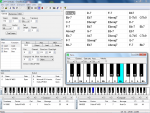OK this is a paragraph from a paper (from NIME 2015) that explains it pretty well:
"We sought to simplify the process of improvising to non-modal chord progressions. This led us to develop a software MIDI remapper called ChordEase that repurposes ordinary MIDI instruments by giving them new interfaces. These interfaces eliminate the need to play a different scale for each chord, the related need to play accidentals, and more generally the need to remember or even know the chord progression. ChordEase alters the pitches of notes in real time while preserving their rhythm and dynamics. Control over pitch is partially sacrificed in exchange for the freedom to approach non-modal music as if it were modal. By delegating the more computational aspects of improvisation to ChordEase, users are able to focus on other aspects, such as rhythm, dynamics, feel, group interaction, and aesthetics, even at fast tempos."
Notice that you can play a song without even knowing the chord changes! However you'll probably get better results if you do know the changes, because that familiarity lets you anticipate and use common tones in your improvisation. The real point though is that you can improvise without focusing on chord analysis, scale-switching, keys, transposition etc. and this allows you to relax and concentrate on other aspects such as feel, aesthetics, and group interaction.
Playing changes at fast tempo normally requires a very significant cognitive load just to avoid obvious mistakes. Jazz players often like to unwind by playing modal music, because this temporarily relieves them of the cognitive load of following changes. ChordEase effectively makes it so that you're always playing modal music, even when you're playing changes, and this lets you play more freely, and turn your ideas and emotions directly into gestures.
It also means you only have to practice melodic vocabulary in one key (C), and this is a huge gain on instruments such as keyboard where each key has a different fingering; it means you only need to learn each lick once instead of twelve times. ChordEase also lets you transpose a song without relearning it--useful when accompanying singers--or transpose spontaneously while playing, just for the fun of it. And of course song complexity and tempo are no longer constraints: if you really want to play "Giant Steps" at 300 BPM, you can.

